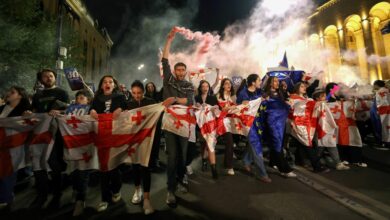
“Russians who get their truth from the state media are living in an alternate reality,” Madeline Roache says.
Every day Roache watches the morning “news” on Channel One, a top Russian state TV channel. She tracks the narratives that Russian viewers are hearing. And she writes a report for NewsGuard about the “alternative reality.” NewsGuard, a startup that rates the reliability of news sources, began publishing Roache’s summaries on Monday.
Overall, Roache told CNN, on state-run TV, “the Russian army is portrayed as triumphant — as not sustaining any losses, any casualties, and is certainly not committing any atrocities. Meanwhile, according to the state media, it’s the Ukrainian army committing atrocities, killing civilians, sustaining heavy losses and losing territory to the Russian forces.”
This comment of Roache’s stood out to me the most: “Russians would have every reason to feel proud based on what they’re seeing on the state TV.”
Working with producer Aaron Cooper, I compiled this report for Monday’s edition of “The Lead with Jake Tapper” about the upside-down nature of Russian state media. Experts say the Putinesque programming still has a very firm hold on Russian public opinion, despite a wealth of real reporting from Ukraine that contradicts it. As CNN’s Nic Robertson told us, “It’s no surprise that so many people are just following along with the Kremlin’s lines. It is the easiest thing for them to do. They don’t see an alternative. They feel powerless and it’s information they’ve been fed year upon year upon year by Putin and by the Soviet leadership back in those days.” Watch…
Moscow’s blackout
Here is some crucial context when thinking about this topic: “Essentially journalism has been banned now in Russia,” Anne Applebaum pointed out on “Reliable Sources” the other day. “It’s now illegal to talk about this so-called ‘special military operation’ as a war or to call it an invasion. And that means most Western correspondents have left. All of the independent Russian media which did exist before the war has now been banned; many of those journalists have left the country as well. So the true story of what goes on in Russia is now getting harder and harder to tell.”
We get glimpses inside the country, through the eyes of people like Vladimir Kara-Murza, a Russian opposition politician who recently taped an interview with CNN+ anchor Sara Sidner. He told Sidner that this war will be Putin’s downfall. On Monday he was detained outside of his apartment building in Moscow, according to multiple reports.
Daniel Dale’s analysis
Jake Tapper said it best on Monday: Russia is engaging in a “fierce propaganda war to justify its unprovoked, brutal invasion and to try to cover up the growing number of atrocities and massacres being committed against Ukrainian civilians.”
He asked CNN fact-checker Daniel Dale to assess some of the specific deceptions that Russian outfits are distributing. Here’s one from Dale: “The Russian government has claimed that not a single local resident was killed while Russian troops were in Bucha and that evidence to the contrary was staged or faked or a hoax. These claims are frankly ridiculous. They’re totally false. It has been conclusively demonstrated that civilians were indeed killed while Russian troops were in Bucha and, witnesses say, by Russia.”
This is “exhausting” to keep track of, Dale added, “and I think that’s the point. I think what Russia is doing is throwing so much nonsense at the wall, that either some of it sticks and gets believed, or just that it all tires people out. That people get so confused and overwhelmed by everything being contested — even the most obvious-seeming of facts — that they throw up their hands and say ‘I don’t know what’s true. I can’t keep track of all this.’ And that’s tough, and I think we as journalists have to fight hard against that.” Amen…
“They want to believe that their country is good”
On the latest episode of CNN’s “Tug of War” podcast, senior international correspondent Matthew Chance — who was based in Moscow for years — expressed why Kremlin propaganda is so embraced by so many people: It’s because “they want to believe that their country is good,” not an evil regime that “kills people for no reason.” Think about it, Chance said, “who would want to acknowledge that there’s something fundamentally wrong with your country?”




